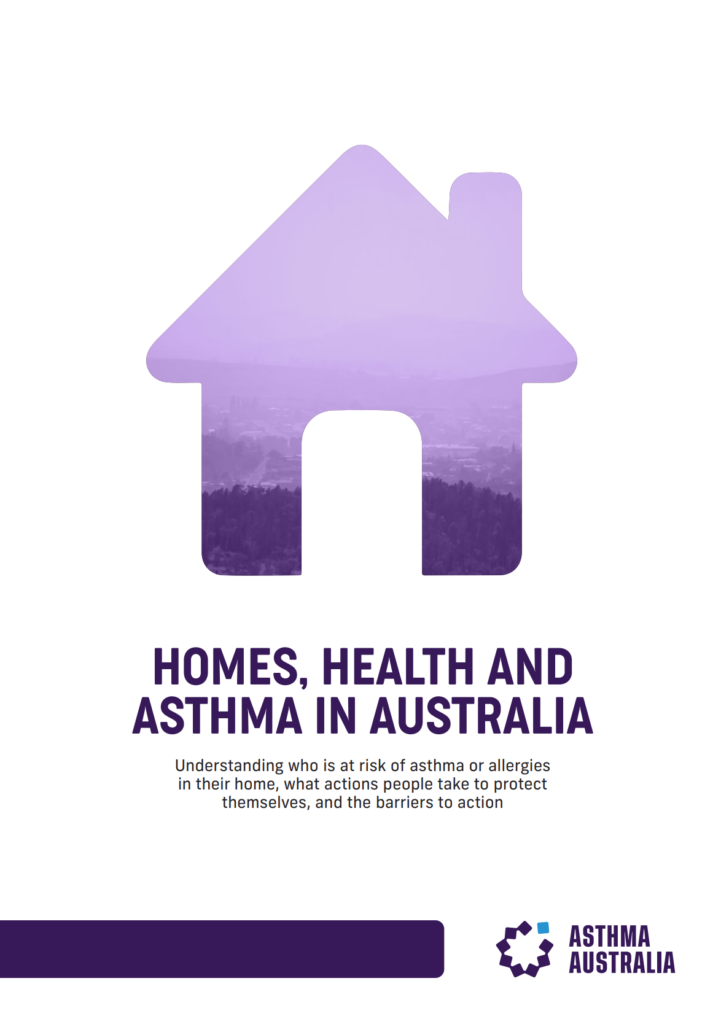
Homes should be safe and secure spaces that support our health and wellbeing. Our homes should provide us with shelter, access to efficient and healthy energy sources, sufficient space, as well as a sense of belonging, security and privacy. The home environment should also protect us from pollutants, hazards, mould and pests. This is particularly important for people who have asthma or allergies as they are sensitive to certain substances in the air. These substances are called triggers because they can trigger asthma or allergy symptoms. Some triggers found in Australian homes can also increase the risk of a person developing asthma.
Unfortunately, consumer research by Asthma Australia has revealed that certain asthma triggers are common in many Australian homes. Our nationally representative survey of over 5,000 people focused on indoor air pollution from cooking, gas or wood heating, mould and dampness and pests (including ants, spiders, mice, cockroaches and dust mites). We found that many people are exposed to these triggers in their homes and that some population groups are more likely to be exposed to certain triggers. Those most at risk include people with asthma, Aboriginal and Torres Strait Islander people, people living in social housing and people with children in their homes.
Our research also found that most Australians are taking action to reduce their exposure to mould and pests in their homes. We also found that the groups more likely to be exposed to these triggers were also more likely to be taking action to combat them. However, only six out of 10 people are confident to make changes to improve the air quality inside their home. Common barriers are cost, not owning the home, not being concerned or not knowing what to do.
Additionally, while gas cooktops are associated with adverse health and environmental outcomes, they are both the most common type of cooktop in Australian and the most popular choice. Just one quarter of Australians are aware that emissions from gas appliances can trigger asthma or allergy symptoms, compared to 82% of people for dust and 70% for mould.
Worryingly, our research showed 7% of Australians still use unflued gas heaters. These heaters release harmful pollutants directly into the home. A further 8% of people use flued gas heaters and while most of the pollution from these heaters should be vented to the outdoors, these appliances contribute to fossil fuel emissions.
Additionally, 13% of people reported regular use of wood heaters, which can release harmful pollutants into the home and cause outdoor air pollution which affects neighbours. Unlike with cooking, our survey found a strong preference for efficient and healthy types of home heating, with nearly half of Australians saying they would prefer to have reverse cycle or central air conditioning. In contrast, 15% preferred wood heating and 7% preferred gas heating. However, cost and not owning the home are common barriers to switching to reverse cycle heating.
Finally, the survey suggests triggers in Australian homes are likely to be worsening asthma and allergy symptoms. Almost one third of people with asthma or allergies have worse symptoms when they are at home, regardless of whether they own their home, rent or live in social housing. This is the opposite of what we want, which is safe, healthy and secure homes.
Asthma Australia has identified areas for policy reforms that would make our homes healthier. We will be working with stakeholders to advocate for improvements such as financial supports for low-income households to improve home health, incentives for landlords to improve rental home health, improving social housing, increasing standards for new homes and education programs to raise awareness around home health.
Click here to tell us what action you’d like us to take to address housing and asthma.
Click here to read more about Asthma Australia’s housing and asthma research in our report, “Homes, Health and Asthma”.
Read more about Asthma Australia’s policy recommendations to improve housing and health in our policy position statement.





 1800 278 462
1800 278 462



